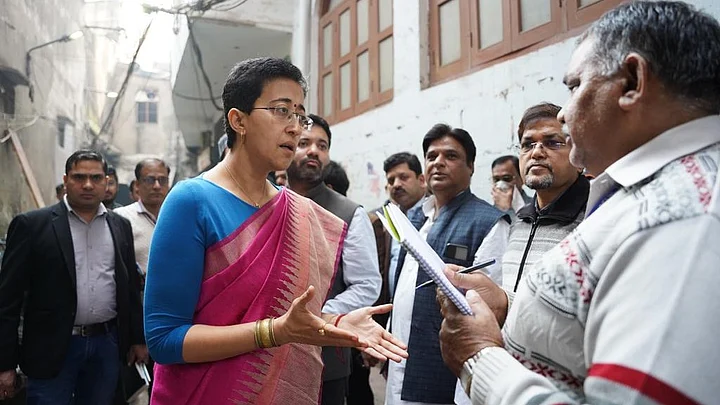Delhi Water Minister Atishi Marlena directed the Delhi Jal Board Chief Executive Officer on Wednesday, 13 December, to visit the field twice a week to address the issue of overflowing sewers in Delhi and resolve the issue promptly.
In the notice, Atishi said, “My office has been constantly receiving complaints regarding sewer overflow from different parts of Delhi. I have personally visited several areas in Sultanpur Majra, Pocket A, Mayur Vihar, Ashok Vihar, Chitla Gate, and Nehru Hill, along with local area officers. I am disappointed to say that the ground situation in these areas was not only dismal but inhuman.”
“During my visit, I found dirty sewer water flowing onto the roads. In most cases, people living in the vicinity informed me that they have been facing these issues for several months now."Water Minister Atishi
Residents have reported persistent sewer overflow issues, forcing them to step on bricks to exit their homes. Despite multiple complaints to the DJB, no resolution has been achieved, highlighting the need for urgent action.
“Even more shocking is the fact that the local area officials who accompanied me on these visits seemed unaware of the issues faced by the public on the ground. In most cases, the local area officers were oblivious to these problems. I am shocked to say that DJB officials, even senior officers, were unable to answer public queries,” said Atishi.
Atishi criticised the mismatch between officials' understanding and actual ground realities, questioning why issues were directed to the minister's office instead of the local DJB office.
“Sewer maintenance is the primary responsibility of the DJB, as per the Delhi Jal Board Act. If the Delhi Jal Board is unable to discharge its duties in a time-bound manner, then heads should roll," mentioned Atishi.
"I had earlier directed the CEO to issue strict directions to all DJB officers to resolve all public complaints within 48 hours. No negligence on this front will be accepted,” she further added.
Atishi mentioned that the officers from the DJB should actively inspect sewage conditions and react quickly to public concerns. To avoid issues, routine inspections of Assembly constituencies should be carried out by the CEO, members, chief engineers, additional chief engineers/superintendent engineers, additional engineers, and junior engineers.
“Reports of these field visits must be submitted in the office of the CEO and Chairperson on every Monday,” instructed Atishi.
(With IANS Inputs)
